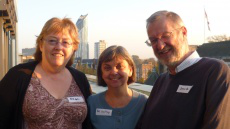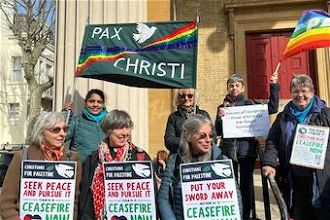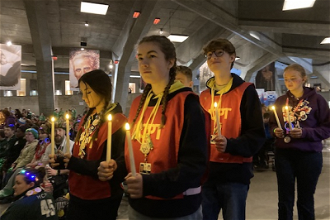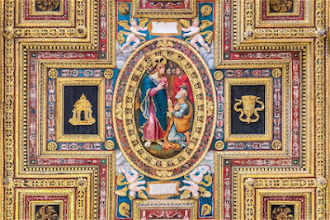National Justice & Peace Network responds to economic crisis

l-r Ellen Teague, Pat Gaffney, John Battle
Supporting the Tobin Tax, exploring new economics and investing ethically were some 'alternatives' to the prevailing economic model explored at Saturday's National Justice and Peace Network (NJPN) Day in London. Around 60 people from around the country attended the quarterly meeting at CAFOD's South London office, all invited to put their ideas forward. The meeting was chaired by Maria Elena Arana of CAFOD.
The day began with readings of interviews with activists at London 'Occupy' sites, all suggesting that something is seriously wrong with values and actions prevalent in the current neo-liberal economic system and in the corporate world.
"Nothing will change if we simply wait for the government to do it", said Alison Gelder of Housing Justice when she introduced a brainstorming about Christian alternatives.
Many people present had visited tent cities at St Paul's and Finsbury Square - Fr Joe Ryan, Chair of Westminster J&P, had visited St Paul's six times and been "inspired" by the democratic process of dialogue and setting daily agendas. It was suggested that NJPN could learn from the 'Occupy' movement in using Twitter and other new media for campaigning.
In the first presentation Pat Gaffney, General Secretary of Pax Christi, challenged British society to develop new notions of security not based on militarism and nuclear weapons. It is estimated that Britain could save more than £70 billion by doing a U-turn on renewing the Trident missile system. She has just returned from Edinburgh where an international group of church representatives met last week to discuss the prospects for a world without nuclear weapons. The group was brought together by the World Council of Churches as it seeks to develop a common advocacy agenda among the global church community to help engage public and political support for the next steps towards a world free of nuclear weapons. Participating were the Moderator of the General Assembly of the Church of Scotland, the Very Rev Dr Alan McDonald, and the head of the Catholic Church in Scotland, Cardinal Keith O'Brien. Talks were also held with the Cross Party Group for Nuclear Disarmament in the Scottish Parliament. She also pointed to a non-violent direct action campaign in Korea, supported by the churches, to stop a military base being built on the scenic island of Jeju and destroying its environment.
In the second presentation, Ellen Teague of Columban JPIC pointed to the Transition Network (where local communities work to de-carbonise their economies), the EcoCell programme of Christian Ecology Link (where small groups meet regularly to monitor and reduce their carbon footprints) and the Livesimply Parish Award scheme (where Catholic parishes can become beacons of environmental stewardship and promoting more sustainable living).
She explained the Green New Deal, produced by the New Economics Foundation, which calls for joined up policies to solve the triple crunch of the credit crisis, climate change and high oil prices. It contains two central strands of reform: major structural changes to national and international financial systems, including taxation, plus sustained investment in energy conservation and renewable energy generation. Details include: an Oil Legacy Fund, paid for by a windfall tax on the profits of oil and gas companies; minimising corporate tax evasion by clamping down on tax havens and corporate financial reporting; breaking up discredited financial institutions; re-regulating national and international financial systems; and investing in green energy and jobs. On an international level, with climate talks about to start in South Africa, it was felt that the international community must give priority to delivering a fair and equitable international climate agreement to succeed the Kyoto Protocol. In addition, poor countries must be given the opportunity to escape poverty without fuelling global warming by help to finance massive investment in climate-change adaptation and renewable energy.
Former MP John Battle spoke of his grassroots experience of 'alternatives' in Leeds where credit unions built up by the churches tackled the power of loan sharks. In another project, a centralised 'meals on wheels' service was decentralised so that people received cooked meals from others in their own neighbourhoods, so strengthening community links. He was delighted that NJPN is supporting the 'Close the Gap' campaign of Church Action on Poverty, but also urged building alliances in the secular world where there is common ground on promoting justice, peace and environmental sustainability. "Build alliances" he said "even if they're not your best friends". He also said "we must get the church out on the side of the poor".
Many J&P groups at diocesan level described dealing with victims of the current economic system. Portsmouth Diocese reported a recent survey in Southampton which showed a big increase in rough sleepers. Cardiff Diocese reported women from DR Congo being forced to work as prostitutes on the streets of Cardiff. The meeting felt that economic crisis should not be allowed to lead to reductions in welfare for the most vulnerable in British society.
The meeting concluded with a short liturgy.
For more information and to read some of presentation texts later this week, see: www.justice-and-peace.org.uk





















